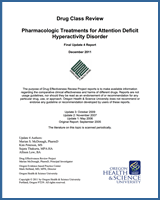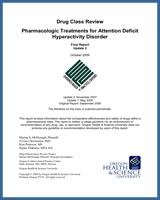NCBI Bookshelf. A service of the National Library of Medicine, National Institutes of Health.
This publication is provided for historical reference only and the information may be out of date.
According to the most recent National Institutes of Health Consensus Statement (1998), "attention deficit hyperactivity disorder is the most commonly diagnosed childhood behavioral disorder." A wide range of drugs are available to treat ADHD, with stimulant medications being the historically the treatment of choice. There are now many stimulants and multiple formulations of individual stimulants, on the market. Additionally, there are non-stimulant medications that are used to treat ADHD, including atomoxetine, atypical antipsychotics, bupropion, clonidine, and guanfacine. The purpose of this review is to evaluate the comparative evidence of benefits and harms of medications used to treat ADHD, with specific emphasis on evaluating the newer long-acting stimulant formulations and the nonstimulant medication atomoxetine relative to each other and the older immediate release stimulant medications. The review includes both children and adults.
Contents
- Introduction
- Methods
- Results
- Summary
- References
- Appendix A. Glossary
- Appendix B. Scales used to assess efficacy and adverse events
- Appendix C. Search strategy: Update 3
- Appendix D. Methods used to assess quality of studies
- Appendix E. Excluded trials
- Appendix F. Previous systematic reviews
- Appendix G. Black box warnings of ADHD drugs approved by the US Food and Drug Administration
- Evidence Tables
Update 2: November 2007
Update 1: May 2006
Original Report: September 2005
The medical literature relating to this topic is scanned periodically. (See http://www.ohsu.edu/ohsuedu/research/policycenter/DERP/about/methods.cfm for description of scanning process). Prior versions of this report can be accessed at the DERP website.
Suggested citation:
McDonagh MS, Christensen V, Peterson K, Thakurta S. Drug Class Review on Pharmacologic Treatments for Attention Deficit Hyperactivity Disorder. 2009. http://www.ohsu.edu/drugeffectiveness/reports/final.cfm
This report reviews information about the comparative effectiveness and safety of drugs within a pharmaceutical class. The report is neither a usage guideline nor an endorsement or recommendation of any drug, use, or approach. Oregon Health & Science University does not endorse any guideline or recommendation developed by users of this report.
- Review Drug Class Review: Pharmacologic Treatments for Attention Deficit Hyperactivity Disorder: Final Update 4 Report[ 2011]Review Drug Class Review: Pharmacologic Treatments for Attention Deficit Hyperactivity Disorder: Final Update 4 ReportMcDonagh MS, Peterson K, Thakurta S, Low A. 2011 Dec
- Attention-deficit hyperactivity disorder: recent advances in paediatric pharmacotherapy.[Drugs. 2010]Attention-deficit hyperactivity disorder: recent advances in paediatric pharmacotherapy.May DE, Kratochvil CJ. Drugs. 2010; 70(1):15-40.
- Review Efficacy and safety limitations of attention-deficit hyperactivity disorder pharmacotherapy in children and adults.[CNS Drugs. 2009]Review Efficacy and safety limitations of attention-deficit hyperactivity disorder pharmacotherapy in children and adults.Wigal SB. CNS Drugs. 2009; 23 Suppl 1:21-31.
- Viloxazine for the Treatment of Attention Deficit Hyperactivity Disorder.[Health Psychol Res. 2022]Viloxazine for the Treatment of Attention Deficit Hyperactivity Disorder.Robinson CL, Parker K, Kataria S, Downs E, Supra R, Kaye AD, Viswanath O, Urits I. Health Psychol Res. 2022; 10(3):38360. Epub 2022 Sep 23.
- A cost-effectiveness analysis of off-label atypical antipsychotic treatment in children and adolescents with ADHD who have failed stimulant therapy.[Atten Defic Hyperact Disord. 2...]A cost-effectiveness analysis of off-label atypical antipsychotic treatment in children and adolescents with ADHD who have failed stimulant therapy.Sohn M, Talbert J, Moga DC, Blumenschein K. Atten Defic Hyperact Disord. 2016 Sep; 8(3):149-58. Epub 2016 May 3.
- Drug Class Review: Pharmacologic Treatments for Attention Deficit Hyperactivity ...Drug Class Review: Pharmacologic Treatments for Attention Deficit Hyperactivity Disorder
Your browsing activity is empty.
Activity recording is turned off.
See more...

